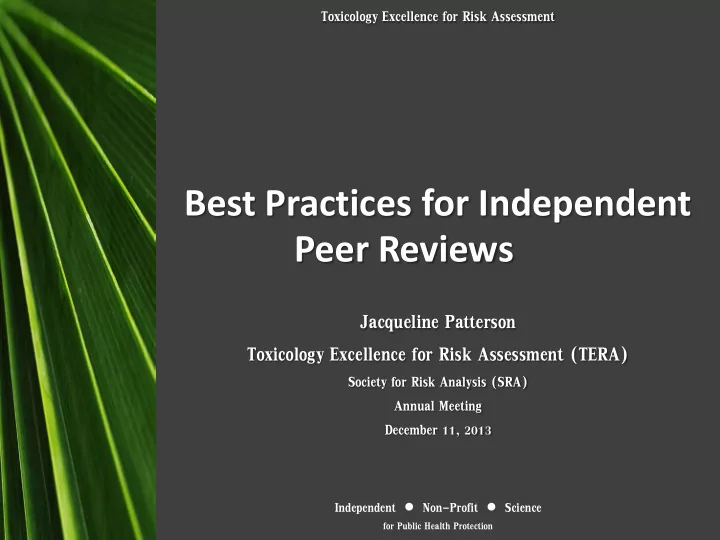

Toxicology Excellence for Risk Assessment Best Practices for Independent Peer Reviews Jacqueline Patterson Toxicology Excellence for Risk Assessment (TERA) Society for Risk Analysis (SRA) Annual Meeting December 11, 2013 Independent ● Non-Profit ● Science for Public Health Protection
Robust Processes To insure quality and independence of results • Scientific – Selection of experts – Quality and completeness of review materials – Comprehensive charge questions – Clear reporting of results • Administrative – Peer review plan – Clear instructions to experts – Defined roles for participants – Documentation of results – Independence Independent ● Non-Profit ● Science 2 for Public Health Protection
Principles or Best Practices for a Successful Peer Review • Appropriate Experts • Scientific Robustness • Transparency • Independence Independent ● Non-Profit ● Science 3 for Public Health Protection
Appropriate Independent Experts • Appropriate experience to address key issues • Balance of views on key topics • Diversity in institutional backgrounds and Peer– a person perspectives who is the equal • Risk assessment expertise of another in abilities and essential qualifications Independent ● Non-Profit ● Science 4 for Public Health Protection
Panel Selection Procedures • Evaluate subject document closely to identify key questions, guiding determination of types of experts and experience needed • Broadly search for experts • Evaluate credentials and potential for conflicts of interest and biases • Select a panel that is balanced with regard to necessary disciplines and has a diversity of perspectives Independent ● Non-Profit ● Science 5 for Public Health Protection
Peer Review for Risk Assessment – Data – Alternate interpretations – Mode of action – Assumptions – Calculations – Counterfactual evidence – Conclusions Independent ● Non-Profit ● Science 6 for Public Health Protection
Complete Review Package • Quality work product – Ready for Review • Balance between essential information and reviewers’ time • References and data readily available • Clear charge and instructions • Assist peer reviewers Independent ● Non-Profit ● Science 7 for Public Health Protection
Peer Review Charge Purpose - identify the key scientific issues and guide the experts to consider each important issue in a multi- disciplined way • Comprehensive - yet focused on most important questions to address purpose of peer review • Experts must understand the purpose and context for the assessment – problem formulation • Objective - developed independently- with input from authors – to insure all key issues included and objectivity of question wording • Provide experts clearly worded questions, with well- defined criteria for evaluation and clear instructions Independent ● Non-Profit ● Science 8 for Public Health Protection
Panel Meetings Skilled chair with risk assessment expertise • to guide panel through issues Focused agenda and pacing • Authors present to answer and ask • questions Interested parties allowed to contribute • scientific data and analyses and ask questions Independent ● Non-Profit ● Science 9 for Public Health Protection
Transparency • An operational philosophy that allows interested persons to evaluate and judge the adequacy and credibility of the process and results • Open meetings/process that welcomes input • Documentation of process and results • Independent evaluation of responsiveness of authors Independent ● Non-Profit ● Science 10 for Public Health Protection
Independence – more than just conflict of interest • Process and participants need to be independent of the outcome • A third party – not the authors or sponsoring agency or organization, should - – Select experts – Prepare charge questions – Keep authors, sponsors, and stakeholders at arm’s length from experts • Evaluate authors’ responsiveness Independent ● Non-Profit ● Science 11 for Public Health Protection
The most critical element Independent ● Non-Profit ● Science 12 for Public Health Protection
Peer Review is Important • Recent survey by George Mason University of SRA, SOT, and ISRTP risk assessors found that*: • 73% agreed that external independent peer review is very important • 78% indicated external peer review should be conducted independently of the office or program that develops a risk assessment • 65% would create an independent entity that insures authors would respond to peer review comments *Robert Lichter presentation, Webinar and Study Report available at www.istrp.org Independent ● Non-Profit ● Science 13 for Public Health Protection
What do peer reviewers think about current peer review practices? • What is essential for a good peer review? • What hinders a good peer review? • What improvements or changes would you suggest? Independent ● Non-Profit ● Science 14 for Public Health Protection
What do peer reviewers think about current peer review practices? • What is essential for a good peer review? • What hinders a good peer review? • What improvements or changes would you suggest? Independent ● Non-Profit ● Science 15 for Public Health Protection
References • Meek, ME, Patterson, J; Strawson, J; Liteplo, R. (2007) Engaging Expert Peers in the Development of Risk Assessments. Risk Anal. 27(6):1609- 1621. • Turner, RS. 2009. Best Practices in Peer Review Assure Quality, Value, Objectivity. Journal of the National Grants Management Association 17:1 • George Mason University. 2013. Expert Opinion on Regulatory Risk Assessment. Results of a Survey of SRA, SOT/RASS and ISRTP members . Available at www.Isrtp.org Independent ● Non-Profit ● Science 16 for Public Health Protection
Recommend
More recommend